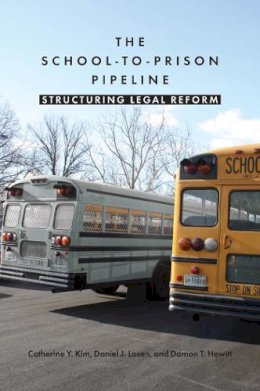
The School-to-Prison Pipeline: Structuring Legal Reform
Catherine Y. Kim
An in-depth analysis of the legal entry points and remedies in the school-to-prison pipeline
The “school-to-prison pipeline” is an emerging trend that pushes large numbers of at-risk youth—particularly children of color—out of classrooms and into the juvenile justice system. The policies and practices that contribute to this trend can be seen as a pipeline with many entry points, from under-resourced K-12 public schools, to the over-use of zero-tolerance suspensions and expulsions and to the explosion of policing and arrests in public schools. The confluence of these practices threatens to prepare an entire generation of children for a future of incarceration.
In this comprehensive study of the relationship between American law and the school-to-prison pipeline, co-authors Catherine Y. Kim, Daniel J. Losen, and Damon T. Hewitt analyze the current state of the law for each entry point on the pipeline and propose legal theories and remedies to challenge them. Using specific state-based examples and case studies, the authors assert that law can be an effective weapon in the struggle to reduce the number of children caught in the pipeline, address the devastating consequences of the pipeline on families and communities, and ensure that our public schools and juvenile justice system further the goals for which they were created: to provide meaningful, safe opportunities for all the nation’s children.
Product Details
About Catherine Y. Kim
Reviews for The School-to-Prison Pipeline: Structuring Legal Reform
J.S. Montgomery
Choice
"Fills a much‒needed gap in the school‒to‒prison pipeline literature. There is very little information about legal strategies to interrupt the pipeline when you encounter reticent policy‒makers. This book provides just that, and covers all of the bases for doing so. As such, it is an invaluable resource for legal advocates working in the education and juvenile justice fields."
Randee J. Waldman,Barton Juvenile Defender Clinic, Emory Law "Increasingly, we must understand the production of structural disadvantage through a systems lens that focuses on the relationships between critical institutions rather than viewing them as distinct concerns. This incisive new work targets the interface between our K‒12 educational system and our juvenile and criminal justice systems with a fresh, unflinching account that is invaluable to lawyers, organizers and researchers alike."
John A. Powell,Executive Director of the Kirwan Institute for the Study of Race and Ethnicity and the Williams Chair in Civil Rights and Civil Liberties, Moritz College of Law, Ohio State University "This book is a real eye-opener. For anyone involved in any way with educating our youth, it is a must-read."
BIZ INDIA
